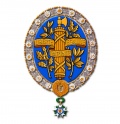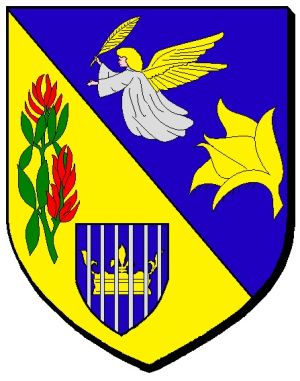Julvécourt: Difference between revisions
Knorrepoes (talk | contribs) m (Text replacement - "{{media}} Literature : Image from http://www.armorialdefrance.fr" to "Literature : Image from http://www.armorialdefrance.fr {{media}}") |
Knorrepoes (talk | contribs) m (Text replacement - "Literature : " to "'''Literature''': ") |
||
| Line 27: | Line 27: | ||
The inescutcheon with crown behind the six bars refers to the taking of the Duke of Lorraine,René 1st, as hostage near the village, in 1431 after the defeat of Bulgnéville, by the Duke of Burgundy, and who was released after the payment of a ransom. | The inescutcheon with crown behind the six bars refers to the taking of the Duke of Lorraine,René 1st, as hostage near the village, in 1431 after the defeat of Bulgnéville, by the Duke of Burgundy, and who was released after the payment of a ransom. | ||
[[Civic Heraldry Literature - France|Literature]] : Image from http://www.armorialdefrance.fr | [[Civic Heraldry Literature - France|'''Literature''']]: Image from http://www.armorialdefrance.fr | ||
{{media}} | {{media}} | ||
Revision as of 09:33, 9 September 2022
French heraldry portal
This page is part of the French heraldry portal |
Heraldry of the World |
|
French heraldry:
Overseas territories:
|
Selected collector's items from France:
|
JULVÉCOURT
Département : Meuse
| French |
Tranché : au 1er d'azur à l'ange en vol, posé en bande, de carnation, vêtu d'argent chevelé et ailé d'or, portant une plume du même de sa main dextre, senestré d'une faîne du même, au 2e d'or à l'écusson d'azur chargé d'une couronne d'or surchargé de six vergettes d'argent brochantes, surmonté à dextre d'un brin de luzerne en pal, tigé et feuillé de sinople, fleuri de gueules. |
| English | No blazon/translation known. Please click here to send your (heraldic !) blazon or translation |
Origin/meaning
The arms were officially adopted on August 18, 2021.
The angel is the attribute of the evangelist Saint Matthew to whom the village church dating from the 17th century is dedicated.
The beechnut symbolises the surrounding forests haunted by the supporting green woodpeckers. The alfalfa sprig represents agricultural activities: crops and livestock.
The inescutcheon with crown behind the six bars refers to the taking of the Duke of Lorraine,René 1st, as hostage near the village, in 1431 after the defeat of Bulgnéville, by the Duke of Burgundy, and who was released after the payment of a ransom.
Literature: Image from http://www.armorialdefrance.fr
Contact and Support
Partners:
Your logo here ?
Contact us
© since 1995, Heraldry of the World, Ralf Hartemink 
Index of the site












